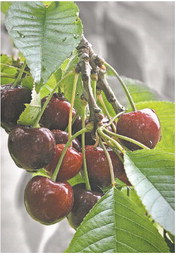When reaching for a cherry for drying, baking, juicing, or making jam, experts recommend a tart (or sour) cherry. Fortunately, Michiganders don’t need to go far to find them, as 70% of the nation’s tart are cherries grown in the state. For snacking, sweet cherries are preferred, and while most are grown on the West Coast, Michigan comes in a close second. Native to Europe and Western Asia, cherries first arrived in North America around 1600 but wasn’t introduced to Michigan until the mid-19th century.
Cherries are a stone fruit, which, along with fruits like peaches, apricots, and even blackberries, have a pit containing a seed surrounded by fleshy meat and covered with a skin. With more antioxidants than any other fruit and anti-inflammatory properties, cherries are considered a superfood and provide benefits to heart health, exercise recovery, and possibly even sleep.
The area around Traverse City is ideal for cherry growing, providing the necessary 800 hours a year with temperatures below 45 degrees Fahrenheit and cooling breezes from Lake Michigan in the summer. While there is a risk of spring frosts killing the year’s blooms, like when 90% of the crop died in 2012, most years see Michigan producing around 150 million pounds of tart cherries valued at over $30 million.
But it isn’t just the sale of tart cherries to processors that benefits the economy, the growth of agritourism and food-related festivals brings tourism dollars to the region and state. Visitors can spend an afternoon at one of the dozens of pick-your-own farms, many of which offer other fruits, vegetables and flowers, playgrounds, petting zoos and even wine bars to provide not just tasty cherries but hours of intergenerational fun.
There is also the annual National Cherry Festival in Traverse City, which attracts nearly 500,000 visitors who spend over $20 million while consuming more than 40,000 pounds of cherries. This week-long festival, which takes place in early July, includes concerts, fireworks, parades and of course pie-eating contests. Begun in 1926, the event has hosted special guests including President Ford, Bob Hope, actors, athletes and astronauts. With 85% of the 150 events free, the festival is accessible to all while benefiting Michigan’s economy and cherry industry.
Michigan’s cherry industry is important for farmers, the community, and the state’s economy and has become part of the state’s culture through events like the National Cherry Festival and farms offering pick-your-own and other family activities. Healthy and great-tasting, cherries bring a little taste of Michigan to the world.
